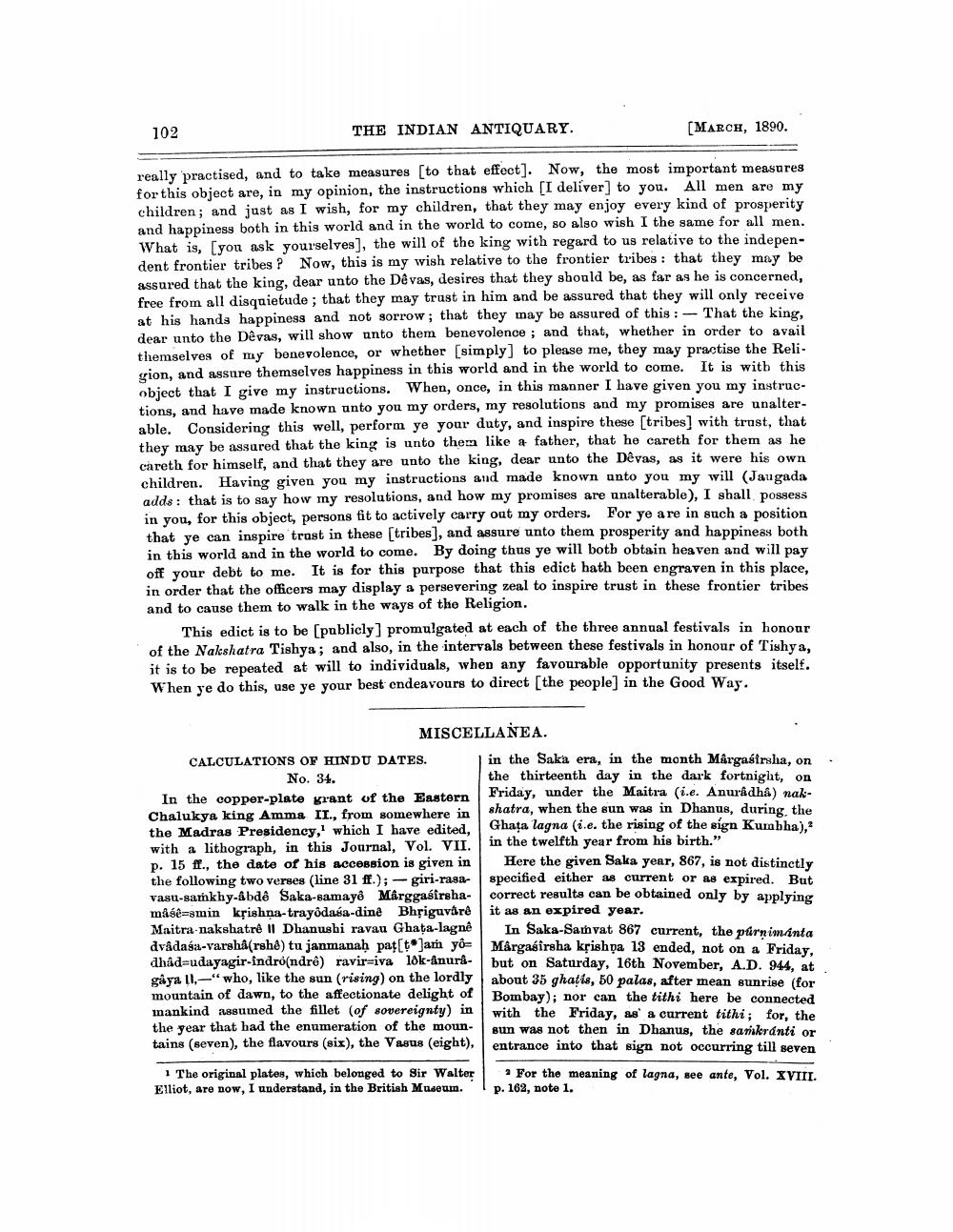________________
102
THE INDIAN ANTIQUARY.
[March, 1890.
really practised, and to take measures [to that effect). Now, the most important measures for this object are, in my opinion, the instructions which [I deliver] to you. All men are my children; and just as I wish, for my children, that they may enjoy every kind of prosperity and happiness both in this world and in the world to come, so also wish I the same for all men. What is, (you ask yourselves), the will of the king with regard to us relative to the independent frontier tribes? Now, this is my wish relative to the frontier tribes : that they may be assured that the king, dear unto the Devas, desires that they should be, as far as he is concerned, free from all disquietude; that they may trust in him and be assured that they will only receive at his hands happiness and not sorrow; that they may be assured of this :- That the king, dear unto the Dêvas, will show unto them benevolence ; and that, whether in order to avail themselves of my benevolence, or whether (simply] to please me, they may practise the Religion, and assure themselves happiness in this world and in the world to come. It is with this object that I give my instructions. When, once, in this manner I have given you my instructions, and have made known unto you my orders, my resolutions and my promises are unalterable. Considering this well, perform ye your duty, and inspire these stribes) with trust, that they may be assured that the king is unto them like a father, that he careth for them as he careth for himself, and that they are unto the king, dear unto the Dêvas, as it were his own children. Having given you my instructions and made known unto you my will (Jaugada adds: that is to say how my resolutions, and how my promises are unalterable), I shall possess in you, for this object, persons fit to actively carry out my orders. For ye are in such a position that ye can inspire trust in these [tribes], and assure unto them prosperity and happiness both in this world and in the world to come. By doing thus ye will botb obtain heaven and will pay off your debt to me. It is for this purpose that this edict hath been engraven in this place, in order that the officers may display a persevering zeal to inspire trust in these frontier tribes and to cause them to walk in the ways of the Religion.
This edict is to be (publicly] promulgated at each of the three annual festivals in honour of the Nakshatra Tishya; and also, in the intervals between these festivals in honour of Tishya, it is to be repeated at will to individuals, when any favourable opportunity presents itself. When ye do this, use ye your best endeavours to direct (the people] in the Good Way.
.
MISCELLANEA. CALCULATIONS OF HINDU DATES. in the Saka era, in the month Margasirsha, on No. 34.
the thirteenth day in the dark fortnight, on In the copper-plate krant of the Eastern Friday, under the Maitra (i.e. Anuradha) nak
shatra, when the sun was in Dhanus, during the Chalukya king Amma II., from somewhere in the Madras Presidency, which I have edited, Ghafa lagna (ie. the rising of the sign Kumbha), with a lithograph, in this Journal, Vol. VII. in the twelfth year from his birth." p. 15 ff., the date of his accession is given in Here the given Saka year, 867, is not distinctly the following two verses (line 31 ff.); - giri-rasa- specified either as current or as expired. But vasu-samkhy-abdê Saka-samayð Marggasirsha- correct resulta can be obtained only by applying mase=smin krishna-trayodasa-dine Bhriguvard it as an expired year. Maitra-nakshatrê Il Dhanushi ravau Ghata-lagne 1 In Saka-Samvat 867 current, the prirnimanta dvádaśas-varshk(rsh8) tu janmanah pat[to Jam yo Margasirsha krishpa 13 ended, not on a Friday. dhåd=udayagir-indró(ndre) raviriva 18k-Anura- but on Saturday, 16th November, A.D. 944, at gâya Il. -" who, like the sun (rising) on the lordly about 35 ghatis, 50 palas, after mean sunrise (for mountain of dawn, to the affectionate delight of
Bombay); nor can the tithi here be connected mankind assumed the fillet (of sovereignty) in with the Friday, as a current tithi; for, the the year that had the enumeration of the moun- eun was not then in Dhanus, the sankranti or tains (seven), the flavours (six), the Vasus (eight), entrance into that sign not occurring till seven
1 The original plates, which belonged to Sir Walter For the meaning of lagna, see ante, Vol. XVIIT. Elliot, are now, I understand, in the British Museum. p. 162, note 1.




